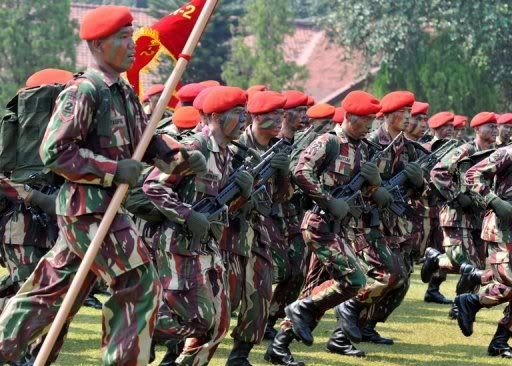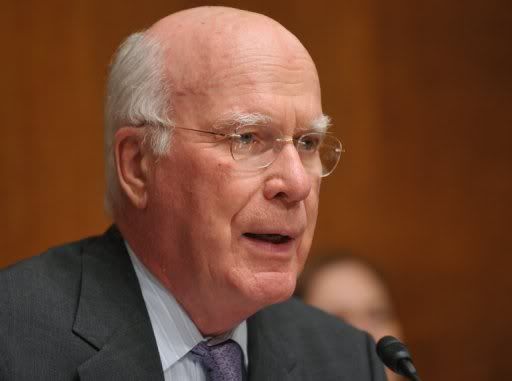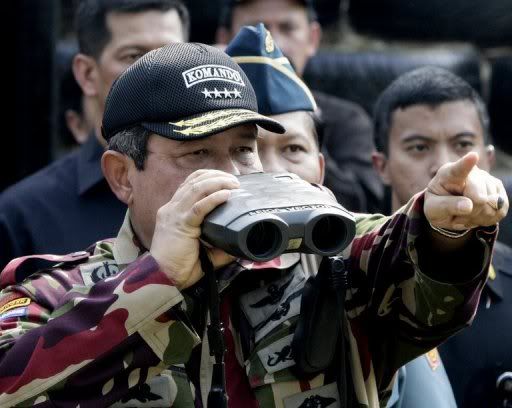
Members of Indonesia's Kopassus Special Forces

US Senator Patrick Leahy said while Indonesia had made progress in its democracy, the past must not be forgotten

Indonesian President Susilo Bambang Yudhoyono gestures as he reviews soldiers of the Kopassus Special Force Command
The United States is looking to break a taboo and train an elite Indonesian force linked to past abuses, as President Barack Obama courts the world's largest Muslim-majority nation with a visit.
With its moderate form of Islam and democratization since the 1990s, Indonesia is increasingly seen in Washington as an ideal partner. Obama spent part of his childhood in Jakarta, giving him a propitious personal connection.
Ahead of Obama's trip next week, top officers from Kopassus -- a military unit that focuses on counter-insurgency and intelligence -- visited Washington to discuss a resumption of training, people with knowledge of the talks said.
The United States cut off support for Kopassus under the so-called Leahy Amendment in 1997, which prohibited training to foreign military units involved in human rights abuses.
Ernie Bower, Southeast Asia director at the Center for Strategic and International Studies think-tank, said military ties were "absolutely fundamental" if the Obama administration was serious about transforming ties with Indonesia.
"Indonesia was going to be the India of the Bush administration -- a country with which they move to a whole new place because they understand it and put a real focus on it," Bower said, referring to former US president George W. Bush's drive to end decades of mistrust with New Delhi.
The talks with Indonesia come amid unease in some circles in Washington about the strong role of the military in the two historic US allies in Southeast Asia -- the Philippines and Thailand.
Pentagon spokesman Bryan Whitman said that the United States was discussing a re-engagement with Kopassus "that's in accordance with our laws, our values and advances our interests."
"Indonesia's democratic reforms over the past decade have been pretty remarkable and its greatly improved human rights record has enabled us to engage more broadly," Whitman said.
The United States ended overall sanctions on the Indonesian military in 2005, the same year that Australia resumed joint training with Kopassus.
But US rights advocates remain deeply uneasy about Kopassus and few expect a deal before Obama leaves on his trip to Guam, Indonesia and Australia on March 21.
Kopassus spearheaded the anti-communist pogrom in 1965 that killed up to 500,000 people. It was seen as a key force in the 1975 invasion of East Timor and the 1999 violence when the territory voted for independence.
Senator Patrick Leahy, who authored the 1997 law that bears his name, stood firm against training. He said that Indonesia must first bring Kopassus members to justice for past abuses.
"It is important that the people of Indonesia see that justice is possible, and that impunity for committing serious crimes is no longer acceptable," said Leahy, a member of Obama's Democratic Party from Vermont.
"Indonesia has made progress in its democracy and in curbing some of the excesses of its military. But the past must not be forgotten," Leahy said.
One compromise under consideration is for the United States to train only younger Kopassus members.
But T. Kumar, the international advocacy director of Amnesty International USA, said Indonesia should try senior officers involved in past wrongdoing.
"Kopassus has such a bad record that to hold no one accountable in a meaningful way sends the wrong message to others," Kumar said.
He called for Obama to meet survivors of the 1965 mass killings. The United States is widely suspected of supporting the pogrom, which future strongman Suharto launched in response to rumors of a communist coup.
Obama moved to Jakarta in 1967 when his mother married an Indonesian. Obama later wrote of a climate of fear in the country in his memoir, "Dreams From My Father."
Walter Lohman, director of the Asian Studies Center at the Heritage Foundation, said Obama should focus less on achieving deliverables in Indonesia and embrace the symbolism of his visit.
"He brings in a lot of personal gravitas and personal connections that are very well regarded in Indonesia. No question, he's hugely popular there," Lohman said.
"His challenge -- is he going to be able to leverage that into broader respect for the US and the presidency itself."





0 comments:
Post a Comment